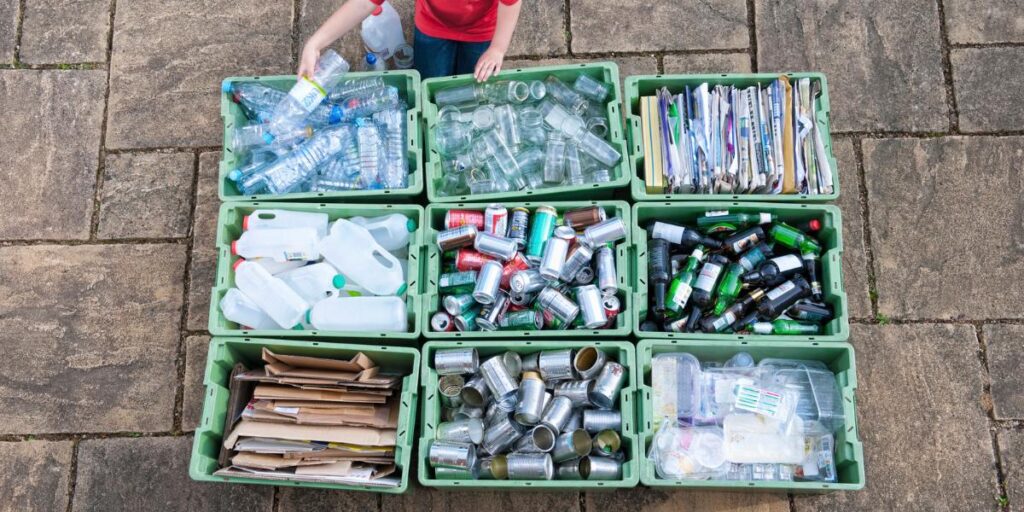Recycling is an incredible way for businesses to champion a healthier planet. The ultimate goal?
Reducing the waste that ends up in those towering landfills, the giant burial grounds for our trash.
But here’s the inspiring part—just by making small, thoughtful changes to how your business handles recycling, you can create a ripple effect that helps combat pollution and safeguard our natural world.
In this guide, we’ll walk through simple, yet impactful steps that any organization can adopt to not only optimize recycling efforts but also make them more environmentally friendly.
These strategies are easy to implement and have the potential to make a lasting difference for your business and the planet.
Craft a Smart Waste Management Plan
Every great initiative starts with a plan. To elevate your recycling efforts, create a comprehensive waste management strategy. For efficient waste disposal solutions, explore our dumpster rental services to support your plan.
This plan should clearly define your recycling goals, specify the materials you’ll be recycling, and outline where and how those materials will be sorted and disposed of.
To make it even more effective, try setting specific, measurable targets—like cutting paper waste by 20% or recycling 90% of plastic bottles by the end of the year. This way, everyone stays focused and motivated to achieve your sustainability goals.

Appoint Recycling Champions
Recycling is a shared responsibility, but having a few dedicated advocates can greatly enhance your efforts. Appoint “recycling champions” within your team—individuals who are passionate about sustainability and eager to set a positive example.
They can work alongside our commercial trash collection services to ensure a streamlined process.
These champions will help promote best practices, ensure everyone is on the same page, and be the go-to experts for any recycling-related questions.
Plus, having leaders on board makes it easier to spread awareness and keep the momentum going.

Conduct Waste Audits to Spot Opportunities
Ever wonder exactly what your company throws away? A waste audit is like doing a deep dive into your trash! This can help identify materials for our construction debris removal services.
By taking a closer look at the types and amounts of waste produced, you can uncover hidden opportunities to recycle more and waste less.
With this newfound data, you can set smarter recycling goals and make informed decisions.
You may discover that certain materials, like packaging or food waste, are prime candidates for composting or specialized recycling.
Make Recycling Easy and Accessible
Convenience is key! To get everyone on board with recycling, you need to make it as easy as possible. Consider placing bins strategically and using our residential trash collection services for more efficient waste management.
Strategically place recycling bins where they’ll be most needed—paper recycling bins by the printers and desks, and plastic or can recycling bins near break rooms or kitchens.
Don’t forget to clearly label each bin, so there’s no confusion about what goes where.
And keep your employees in the loop—send out reminders and updates about your recycling stations to encourage consistent use.

Clearly Sort Recyclables with Proper Signage
It’s easy to mix up where things should go, especially when you’re in a rush.
That’s why having clear, eye-catching signs on your recycling bins makes a world of difference.
Whether you’re opting for single-stream recycling (where all recyclables go into one bin) or multi-stream recycling (where items are sorted by type), clear labels help employees quickly and correctly dispose of materials.
The easier it is to understand, the more likely your team is to recycle properly!
Manage E-Waste With Care
Electronic waste (e-waste) like old computers, phones, and batteries contain harmful materials like heavy metals and chemicals that can leach into the environment if not disposed of properly. Recycling e-waste separately from your regular recycling stream is critical.
Here’s how you can handle it responsibly:
- Special Containers: Set up clearly marked containers specifically for e-waste. This helps prevent confusion and ensures proper disposal.
- Raise Awareness: Make sure your team understands why separating e-waste is important. Share information about the dangers of improper e-waste disposal and how your company’s actions can make a difference.
Educate and Engage Your Team for Maximum Impact
The success of your recycling program hinges on how well your team is engaged.
Here are some tips to get your employees on board and excited about recycling:
- Start Strong: From day one, make recycling a core part of your company culture. During onboarding, explain why recycling is crucial and outline how it’s done within your organization.
- Use Visual Aids: Simplify the recycling process with easy-to-follow visual guides posted near recycling stations. This makes it super clear where different materials should go and encourages participation.
- Friendly Reminders: Even the best efforts can slip if not maintained. Regular, friendly reminders—whether through emails, posters, or meetings—will help keep recycling at the top of everyone’s mind.
- Create a Feedback Loop: Encourage employees to share their thoughts on how your recycling efforts are going. They might have brilliant ideas for improvement or highlight areas where processes could be streamlined.
Celebrate and Track Your Success!
As you implement these recycling strategies, don’t forget to track your progress and celebrate successes!
Whether you reduce waste by 10%, save a certain number of trees, or simply notice more participation in recycling efforts, share these achievements with your team.
Recognizing these milestones fosters a sense of accomplishment and reinforces the importance of staying committed to your sustainability goals.
By integrating these steps into your business practices, you’ll be well on your way to creating a recycling program that not only reduces waste but also builds a more sustainable future for everyone.
It’s a win for your company, a win for the community, and a huge win for the planet!

FAQs
Why is it important for businesses to focus on recycling?
Recycling helps businesses reduce their environmental footprint by minimizing the amount of waste sent to landfills.
It conserves natural resources, reduces pollution, and demonstrates corporate responsibility, which can improve brand image and customer loyalty.
How can my business start recycling if we haven’t done it before?
Begin by crafting a waste management plan that outlines your recycling goals and processes.
Engage your team with education, assign recycling champions, and set up recycling stations throughout your workplace.
Conduct a waste audit to identify what materials you generate and how you can recycle them efficiently.
What are some easy ways to encourage employees to participate in recycling?
Make recycling easy by placing bins in convenient locations, clearly labeling them, and using signage to guide your team.
Regularly remind employees about the importance of recycling, share progress, and celebrate successes to keep enthusiasm high.
What materials can be recycled in an office environment?
Common recyclable materials in offices include paper, cardboard, plastic bottles, metal cans, and electronics (e-waste).
It’s important to check local recycling guidelines to ensure proper sorting and disposal.
What is a waste audit and how can it help improve recycling?
A waste audit is a process where you analyze your company’s trash to determine the types and amounts of waste produced.
This insight helps you identify areas where recycling can be improved and pinpoint opportunities to reduce overall waste.
Why is handling e-waste separately so important?
E-waste contains harmful chemicals and heavy metals that can be dangerous to human health and the environment if disposed of improperly.
Recycling e-waste safely ensures these materials are handled in a way that prevents pollution and conserves valuable resources.
What are some cost-saving benefits of implementing a recycling program?
Recycling can reduce waste disposal costs, especially in businesses that produce large amounts of recyclable materials.
Additionally, by diverting waste from landfills, companies may qualify for tax incentives, rebates, or other financial benefits tied to sustainability efforts.
How do we measure the success of our recycling program?
Track your recycling efforts by measuring the amount of waste diverted from landfills, the reduction in your overall waste output, and employee participation rates.
Regularly review your goals and adjust your strategy as needed to continuously improve.
What if our company is too small to have a large-scale recycling program?
Even small businesses can make a big impact! Start small by focusing on the most common waste streams in your office, like paper and plastic.
You can gradually expand your program as your team becomes more familiar with the recycling process.
Small-scale efforts, such as placing recycling bins in key areas, can lead to meaningful change over time.
Can recycling actually save our business money in the long run?
Yes! Recycling can reduce waste disposal costs, especially if your company generates significant amounts of recyclable materials.
In some cases, recycling programs help businesses avoid landfill fees and benefit from rebates or incentives for being environmentally conscious.
Conclusion
Incorporating effective recycling practices into your business isn’t just about reducing waste; it’s about fostering a culture of environmental responsibility that resonates with your team, customers, and community.
By implementing a waste management plan, engaging employees, and making recycling easy and accessible, you can turn small, simple actions into big, long-lasting benefits for the planet.
From reducing your environmental footprint to setting a positive example in your industry, the steps to optimize your recycling processes are clear and achievable.
So, rally your team, appoint recycling champions, and start taking steps today to make your business greener and more sustainable. Together, we can all make a meaningful difference!
